Issue Number 53, Summer 2021
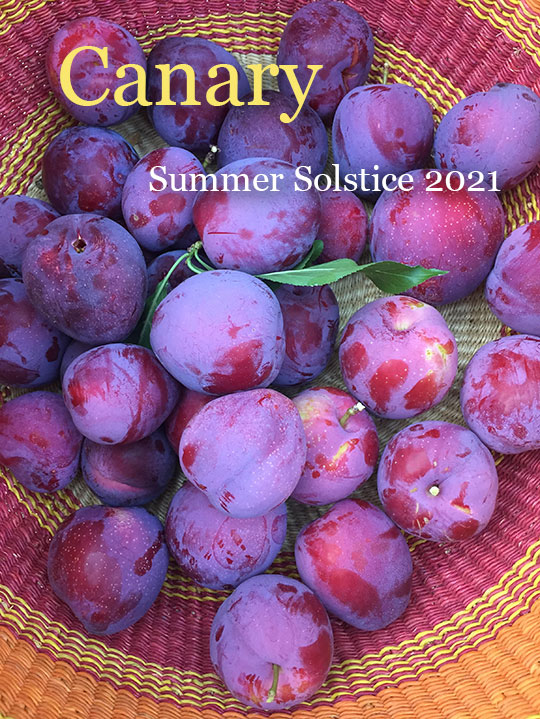
Contents
- Spring to summer by Wendy Blaxland
- Another summer day by Wendy Blaxland
- River Eye by Eric Shaffer
- Call of the Krill by Gloria Heffernan
- The Wild Boars of Fukushima by Gloria Heffernan
- [schema geometrica] [w/a Slice of Apple & an Elephant] by Dennis Hinrichsen
- Sitting Cross-Legged in My Garden at Sunset by A.E. Hines
- Hike to Warrior Point, Sauvie Island, Oregon by A.E. Hines
- Drought by A.E. Hines
- Enclosure by Joan Gibb Engel
- Mimulus Lewisii Wild Snapdragon by Caroline Goodwin
- Impatiens parviflora Slipperweed by Caroline Goodwin
- Chenopodium album Hog’s Delight by Caroline Goodwin
- Bees by Sue Proffitt
- Cabbage Whites by Sue Proffitt
- road trip by Moira Magneson
- From the Long Poem, “When One Has Walled a Long Time All Alone” by Dennis Camire
- Day for Night by Valerie Sopher
- Tide Pool by Coralyn Johnson
- Death of the Botanist by Mary Morris
- Clifton Gorge by Julie L. Moore
- Light Green Hue by Christine Webster-Hansen
- At Baker's Farm by Gary Lark
- Disobedience by Andrew McCall
- Maize by Andrew McCall
- History of a field by Andrew McCall
- Flowering Dragonflies by Martha Nance
- Tuesday Mornings Together on the Buffalo by Kate Wylie
- Lost Pines by Linda Watanabe McFerrin
- Ode to Cedar Waxwings and Toyon Berries by Angie Minkin
- The Ecstasy of Thrushes by Maggie Wadey
Archives: by Issue | by Author Name

Spring to summer
by Wendy Blaxland
Wendy’s home nestles among native Australian bush edging Lane Cove National Park above a creek which roars after rain. Water dragons sun themselves on old boulders shouldering out of the thin Hawkesbury sandstone soil. And huge gum trees provide hole-homes for screeching sulphur-crested cockatoos, crimson-headed king parrots, and gossiping flocks of vibrant rainbow lorikeets.
Ah, no - our lush wisteria blooms are finishing.
All that velvet grace and scent
is fading, falling, gone.
But look – quietly in the wings
of the great spring carnival of flowers
wait a thousand white star jasmine buds,
still furled and folded
like miniature umbrellas,
embroidered on a carpet of green leaves.
Hold your breath.
When the silent conductor nods to them
and flicks a gleaming ray
from his baton just so,
they will unfurl in slow silence
and twirl their way
into the spotlight of our sight,
slow-mo open
into dizzying whorls of scent,
like Sufi mystics
twirling in their trance dance
older than the sun...
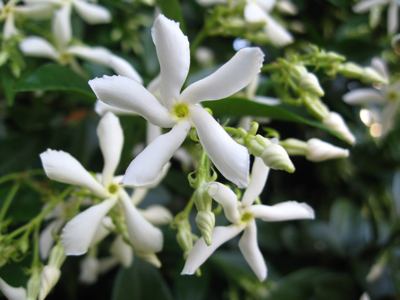
Luca Camellini, CC BY-SA 3.0, via Wikimedia Commons
© Wendy Blaxland

Another summer day
by Wendy Blaxland
Wendy’s home nestles among native Australian bush edging Lane Cove National Park above a creek which roars after rain. Water dragons sun themselves on old boulders shouldering out of the thin Hawkesbury sandstone soil. And huge gum trees provide hole-homes for screeching sulphur-crested cockatoos, crimson-headed king parrots, and gossiping flocks of vibrant rainbow lorikeets.
I float in our pellucid pool:
recognise cicadas across the gully thrumming for a mate,
breathe the swooning scent of fresh pittosporum flowers,
spy a blue-gum shrugging down a scroll of ochre bark
to show her smooth white neck
rising from that rough-frilled gown.

© Wendy Blaxland

River Eye
by Eric Shaffer
Eric lives on the windward side of the mokupuni (island) of O‘ahu in the Ko‘olaupoko moku (district) of the Kailua ahupua‘a (watershed) near the Kawainui Marsh and within Ko‘olau Crater, the remains of a caldera whose seaward wall collapsed nearly two million years ago, providing easy access to more than two thousand miles of ocean.
When I stood on the deck above the rivers I loved, felt the wheel turn
in my hands, and stared down at the shifting, murky, muddy curtain
where the Sacramento and the American became one, I was happy
to be where I was. I spent days alone on the deck of the Damnation
or drove the California Kid against the current into sunset, watching
red-shouldered hawks in cottonwoods overhead. If I did anything
right in those days, it was finding the right things to love and loving
them till they were gone. The world is no better or worse for me
passing through, or for passing through me, bent like the rays sunk
in deep water and glimmers of golden motes in the clouds of silt, soil,
and mud stirred by the flow moving the earth. Everything escapes me
now, so I drop a line into the river, catch what I can, drag snapping,
quicksilver muscle to the deck, and stare for a moment into the cold
and tilting, silver-rimmed darkness of an alien eye from the river bottom
before I release at last what I never meant to catch and cannot keep.

© Eric Shaffer
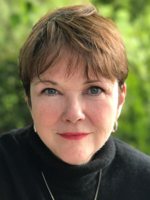
Call of the Krill
by Gloria Heffernan
Gloria lives in the watershed of Onondaga Lake, a body of water sacred to the Haudenosaunee people and the site upon which the Iroquois Confederacy was founded over 500 years ago. Over the past hundred years, this lake was desecrated by industrial pollution and declared "dead" by the EPA in 1994. The Onondaga Nation has worked tirelessly with local officials and the federal government to restore the lake, and now bald eagles return annually to use it as a winter feeding ground.

They move as one
across the Southern Ocean
in swarms a billion strong,
a mile wide.
Shimmering islands
swimming beneath the waves.
No, they are not the creatures
that lure you to Antarctica
with their majesty and grace.
But they lure the humpbacks
who travel 5,000 miles
just to feast on them.
Tiny krill, miraculous in their way.
Each less than an ounce on its own,
combined, a population
that outweighs all of humanity
for the brief Austral summer.
They are the unwitting partners
in the humpbacks’ intricate choreography
as the whales plunge below the surface,
one leader submerging far into the deep
piercing the silence with its song,
signaling its kin to swirl
in synchronized spirals,
erecting walls of bubbles
the frenzied krill cannot penetrate.
And then the gorging
as leviathans break the surface
open-mouthed,
consuming their prey by the ton,
enough in one season
to sustain them for the year ahead.
The synergy of supply and demand,
monumental and miniscule.
All held in place by one point
on the thermometer as the ocean warms.
When we mourn the loss of the whales,
who will remember the krill that fed them
silent and unseen?
© Gloria Heffernan

The Wild Boars of Fukushima
by Gloria Heffernan
Gloria lives in the watershed of Onondaga Lake, a body of water sacred to the Haudenosaunee people and the site upon which the Iroquois Confederacy was founded over 500 years ago. Over the past hundred years, this lake was desecrated by industrial pollution and declared "dead" by the EPA in 1994. The Onondaga Nation has worked tirelessly with local officials and the federal government to restore the lake, and now bald eagles return annually to use it as a winter feeding ground.

They wander in packs
through the ancestral home of
Godzilla and Rodan—
no, not the sculptor…
the mutant pterodactyl
who screeched through
Japanese movie theaters
less than a decade after
the bomb unleashed
its flood of monstrosities.
They stroll down deserted streets,
set up housekeeping
in the abandoned homes
of villagers who fled
first the earthquake
and its attendant tsunami,
and then the meltdown at
the world’s largest
nuclear power plant.
Gorging on poisoned grasses,
swilling contaminated water,
and still they thrive—
over 13,000 at last count.
Too aggressive to domesticate
Too radioactive to eat
Too resilient to die
Officials say the villagers
cannot return
because the wild boars
pose such a threat to safety.
Well, that’s a relief.
At least it’s not
radioactive fall-out
from the meltdown.
Glad to know it’s simply
an invasion of wild boars—
just like the ones in Chernobyl.
Originally published in Awake in the World, vol. 2, River Feet.
© Gloria Heffernan

[schema geometrica] [w/a Slice of Apple & an Elephant]
White man, you are saluted.
Pay a few cents.
D.H. Lawrence, “Elephant”
by Dennis Hinrichsen
Dennis lives a short walk away from the convergence of two rivers in the Great Lakes Basin that flow west to Lake Michigan.
—Ah Ganesh you take the offering so easily
from my hand this is all I know of blindness—by intuition—your vast
shy heart // by touch—your trunk-lipped (fingers really) mountain
of blood // not quite September 1995—New Delhi—the milk drinking
miracle—but still capillarial in its action—the ephemeral—
flash of apple no bigger than my pinky lifted by the forty thousand
muscles of your trunk—tossed to gullet // & then that pause
we allow for gods until one of us begged another & the other obeyed //
—O Awe-&-Wonder immensity what is lifted here—who is lifting //
I stood inside the moment like a fencepost w/arm (not tusk) extended
& sought a breach which was just my hand again w/some 12th moon
sweetness—Florida sunlight a waterfall—my own body a waterfall
of sense & taste—some intermolecular force defying gravity—the way
the keeper had you rear your trunk to reveal where the tusk was snapped—
not cut & poached to its hidden living root—by this I knew you—
by this I knew myself

© Dennis Hinrichsen

Sitting Cross-Legged in My Garden at Sunset
by A.E. Hines
AE lives in Oregon at the confluence of the Columbia and Willamette rivers in the shadow of the volcanoes of the Cascade Range.

Only the bee
labors past the light,
making work
of the black-eyed susan
and faded dahlia.
Like a prison chaplain,
in love with beauty and death,
it salutes the solitary blooms
and ushers each flower
into darkness.
Against my body,
I feel the warm earth
and the tiny necrotic creatures
coming up.
Here amid the lovely dying world
I put down my roots.
First Published online in Claudius Speaks, Issue 3, 2017.
© A.E. Hines

Hike to Warrior Point, Sauvie Island, Oregon
by A.E. Hines
AE lives in Oregon at the confluence of the Columbia and Willamette rivers in the shadow of the volcanoes of the Cascade Range.

The point isn’t to hurry,
but to linger, concealed
at the muddy banks
of the Cascade stream
beneath the archways
of cottonwood and ash,
to watch the egret
standing still above the ripples,
her white-laced twin
shimmering beneath.
The point is to stand still —
to see the great bird,
in small moves, thrust
over and over
the spear of her beak, grateful
for whatever comes up
from the muck.
Even the fallen redwood
is busy here. Half in, half out
of the trembling water,
it feeds decay to wild
licorice ferns and yellow
trillium flowers, makes a home
for the multitude of insects
climbing in and out of the trunk,
its many-fingered limbs
pointing to the sky.
Look here, how this tiny spider
casts her web from the high
branches, how she bridges
such distance, lets herself fall
through the air, sure the tree
will rise up to meet her, that
her thin web will provide.
Previously published in Potomac Review.
© A.E. Hines

Drought
by A.E. Hines
AE lives in Oregon at the confluence of the Columbia and Willamette rivers in the shadow of the volcanoes of the Cascade Range.

We stop and reflect on our memories of rain.
How it fell onto greening fields,
how it slipped beneath the earth’s crusty
surfaces, and slithered home to the rivers,
back when there were rivers,
how, wide and frothy, they ran thick
with Coho and Chinook.
How from the ocean, from the acrid depths
they leapt, as if they were our birthright,
onto our gleaming plates,
how we stabbed them with steely forks,
and steamed our foggy mirror atmosphere
with insatiable hunger.
How we waved off all the warnings —
in the end, a fish would need feet
just to make it up a river,
until the rivers became streams
and the streams just a trickle
that ran across the dry ground the way sweat
runs down the back, as if the earth
were a woman, peeling off layers
and hot-flashing her way
past late middle-age.
Drought was first published in I-70 Review, Summer/Fall issue, 2017.
© A.E. Hines
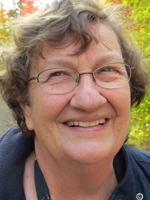
Enclosure
by Joan Gibb Engel
Sadly Joan died a few days before this issue went to press. Her husband asked us to use the following: "In the last weeks of her life Joan looked out each morning at the little garden of native Sonoran Desert plants that she had gathered in the rear of her adobe home in mid-town Tucson, and told her friends that seeing them not only connected her to the surrounding desert ecosystem, but brought back to life the Indiana Dunes where, following in the steps of pioneering field naturalist Henry Cowles, she learned the elements of ecological science and began to write her poetic ecological vision of the world."

she was my moon mine and luna moths’
mine and hoot owls’
mine, muse of firefly daughters
playing peekaboo on humid summer nights
she belonged to desert saguaros
whose hosannas are melon-fragrant cups
and was the treasure of needled pine
their flung arms stilled in her presence
my moon flamed jackrabbit ears
signaled from mountain lions’ all-seeing orbs
men and women too sought to autograph my moon
kiss her radiant skirts with corrugated boots
I gave her away to those windowed helmets
who didn’t know she wasn’t meant to be given
who didn’t know she was theirs and always had been
theirs like the follow and flow of corpuscles
theirs to share the way that water pools
how generous my moon beaming gratis
Earth in all its azure beauty
parading her own nocturnal peace
as dust and broken rock
© Joan Gibb Engel

Mimulus Lewisii Wild Snapdragon
by Caroline Goodwin
Caroline lives and writes in Montara, California, in the San Francisco South Coastal Watershed, with her heart and imagination firmly planted in the Baranof-Chichagof Islands Watershed of Southeast Alaska.

favorite monkey flower use is as a trail nibble
or, together with violet, columbine and geranium,
a striking addition to summer gelatin molds, or
as a June sun, distinctive, maybe toothed, finding
the reaches of the valley now, mouse-ear chickweed,
window box on the South side, paint flake, alpine
lake, that glacier-colored vein in the wrist, heart-
field and raindrop, a story you unfold in another
tongue, and here the metal polish and rust, a space
between planks, newsprint, salmon skin, how a
favorite monkey flower use is as a trail nibble
or a balm, a memory, a kitchen sink, tablecloth,
lament, I meant to say love or forgiveness, meant
a true homesong twisting up the birch trunk, but
summer had come, the boy had already found that
bend in the river, my words turned to pebbles, my
favorite monkey flower use is as a trail nibble
© Caroline Goodwin

Impatiens parviflora Slipperweed
by Caroline Goodwin
Caroline lives and writes in Montara, California, in the San Francisco South Coastal Watershed, with her heart and imagination firmly planted in the Baranof-Chichagof Islands Watershed of Southeast Alaska.

I loved touching the plant’s ripe seedpods
and watching the capsules catapult, the shining
black hulls like eyelids, the early morning with
its glowing colors, its loneliness, and tracing
that scar in my palm, the letter “V” an unmistakable
migratory bird, and the ways in which the creek
insinuated music into the park, the playground,
by all means and carry on and this is a canticle:
tree and field, leaf and green, those long faces
in the cottonwood grove, my father arriving
at the front door screen, my mother’s assertion:
I loved touching the plant’s ripe seedpods
and watching, a beetle and a fine white gull,
the underside of a frond, harp-shaped, a stained
glass lily, the blessing of the fleet, and that which
called me to the edge of the pond? it was the law:
I loved touching the plant’s ripe seedpods
© Caroline Goodwin

Chenopodium album Hog’s Delight
by Caroline Goodwin
Caroline lives and writes in Montara, California, in the San Francisco South Coastal Watershed, with her heart and imagination firmly planted in the Baranof-Chichagof Islands Watershed of Southeast Alaska.

improves the digestion and general well-being
of hens, geese, sheep, swine, morning glory,
barn cat, boy in the ravine, switchblade, trachea,
Scout badge and here my brother with one hand
in the river the other at a rope or wire, him, his,
himself obedient, the body a kind of translation
or book, and it was late in the day the tiny
birds I’d found along the trail having been fed,
their eyes not yet open, longtime companions
gaping at the least sound at the leafy green that
improves the digestion and general well-being
of the mirror, the mantelpiece, the memory of
winter, candelabra, hibernation, the shaving kit
the horsehair brush and hark! an owl a wren
a flock of starlings that scatters and gathers,
American redbreast: once more, with feeling:
improves the digestion and general well-being
© Caroline Goodwin
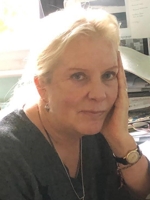
Bees
by Sue Proffitt
Sue lives in Hallsands, a remote settlement and beach situated in Start Bay, South Devon, England. Her favourite walk is from her cottage to Start Point, one of the most exposed peninsulas on the English coast, running sharply almost a mile into the sea. The lighthouse at the end of the headland has guided ships in passage along the English Channel for over 150 years, and the coastal cliffs are the oldest in Devon. The coastline here is still wild, and home to many wild flowers, birds and animals.

Squatting on the ground hunchback
next to a dry bank of earth
he didn’t look up when I bent down,
asked him what he was doing
just pointed – minute black holes
in the brown soil
and bees, innumerable.
Beneath chatter and engines
they hummed through my ears
one low note of total concentration,
placing one drop of nectar in each hole
for one egg. He told me this,
his eyes never leaving them
his delight as serious, as solemn
as the birth of a bee in a tunnel
succoured on nectar.
I remembered another man I saw
on his front lawn, aiming a canister
at violets purpling his grass,
their million open mouths
unable not to swallow,
and a man thrashing nettles
with a stick, his face contorted
leaving them mashed and ragged.
I remembered the fear in each of us -
see what is possible when a man
kneels down next to bees
and opens to them. What’s possible
for me when I open.
© Sue Proffitt

Cabbage Whites
by Sue Proffitt
Sue lives in Hallsands, a remote settlement and beach situated in Start Bay, South Devon, England. Her favourite walk is from her cottage to Start Point, one of the most exposed peninsulas on the English coast, running sharply almost a mile into the sea. The lighthouse at the end of the headland has guided ships in passage along the English Channel for over 150 years, and the coastal cliffs are the oldest in Devon. The coastline here is still wild, and home to many wild flowers, birds and animals.
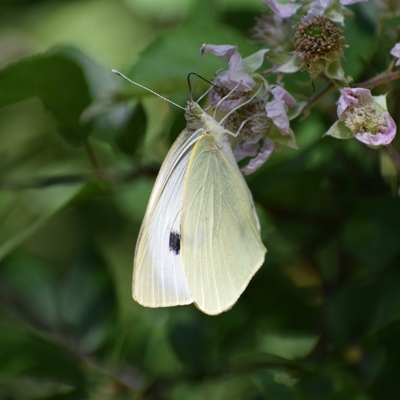
rising and falling
as if the Summer breeze
blows petals from its mouth
as if banks of yarrow
clotting the coastpath
surrender their bodies
as one to air – stem-threads
anchoring creamy rosettes
snapping – as if in the instant
I look up from weeding, planting
digging, hands full of soil
and metal, I remember
how to see faeries. As if
in that instant I remember
what I might see
on the periphery – how
I might choose only to see
what’s sideways and on the edge –
as if I remember that lockdown
is a habit of mind
a fist pressed to the eyes -
as if I expect to see this again
and again, like a gift
meant for me
and not a signal –
a hand waving
farewell.
© Sue Proffitt
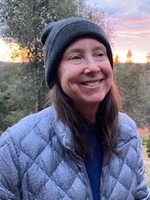
road trip
—for Mo DeCoursey
by Moira Magneson
Along with gray foxes, quail, mule deer, and coyotes, Moira lives on a parcel of clay-red earth in the Sierra foothills. An ephemeral creek threads through her land, a reminder of the nature of impermanence.
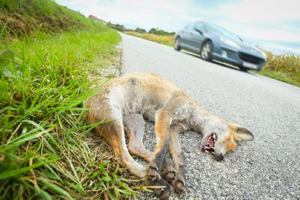
we’d had enough of it your dad
a sack of bones mine a floating fine
particulate snowing on Los Angeles
weyward sisters we fled our dead and dying
left that quaking world behind flew
up the coast in the old Dodge Dart
blue Naugahyde seats stacked with boating
gear & books the Gipsy Kings' guitars
wailed on the radio you rolled
a joint we smoked it to the butt
cut our losses with each toke
lit up into late afternoon
giddy we laughed at the great
cosmic joke morphine drips bedpans
spattered in bile & shit & bits
of lung we'd seen the cells' mad savaging
our fathers come undone
anything was possible
strung out along the pavement the wheel-flung
roadside promenade creatures' lives interrupted
in their crossing
for the next 100 miles we snapped
photos of ourselves stopped beside the slaughter—
possums mice a brindled cat the flattened
stink of skunk a rat without a tail a fox
an owl a rattlesnake a hawk the long
stilled cacophony of howl & song—
what kind of daughter was I? where had I gone wrong?
the sun dropped behind the hills
one last shot you begged I shook my head
no, this was too much misery
but you insisted swerved onto the shoulder
& I stepped out once more this time
to an oily blackened mass impossible
to tell what it had been yet I lay down closed
my eyes let my fingers sink in traced the blown
gone body smashed bone & fur & skin
a fly’s bright buzz criss-crossed my eye padded
the pillow of my cheek strange tenderness
in the picture you took I am asleep
head tipped back to the black
dark matter such utter
ravaged formlessness
your voice called from far beyond
we've got to go c'mon
& I awoke eyes opened
to the last surrendered light stood up brushed
off the gravel & the grass walked to the car
climbed in & we drove north
astonished forsaken windows rolled down
to the sea FM station fading in and out
the night road's unraveling melody
© Moira Magneson

From the Long Poem, “When One Has Walled a Long Time All Alone”
Inspired by Galway Kinnell and the dry stone waller, Dan Snow
by Dennis Camire
Dennis lives on Pinnacle Mountain where the Oxford foothills meet western Maine's northern Appalachian mountain range. He hikes and canoes often in the Androscoggin watershed.

When one has walled a long time all alone
One notes earthworms rising nights to excrete
their castings which, over centuries, will bury the
seemingly indomitable wall so--though surviving the
skidder and property disputes—the wall cannot escape
the laws of mother nature; and so one sees the wall, so
far down the road, as a mansion for the million-plus earth-
worms working each acre below; and one feels, in their boot
sole sinking into mud from last night’s downpour, the gravity
of one’s own mortality though, with the thought of the worm’s
three hearts fueling the half-inch of topsoil they create each
year (all the while playing David to the Goliath of stone),
one grows to accept the decline one feels in laying all
the granite capstone; and one desires, even more,
that green, home burial in pine coffin where the
decaying walls draw so many worms to de-
compose my stone bones back into dirt and
the god-stuff of duff for lovely earthworms
when one has walled a long time all alone.
© Dennis Camire

Day for Night
September 9, 2020
by Valerie Sopher
Valerie lives in the Cerrito Creek-Frontal San Francisco Bay Estuaries watershed.

the day the sky stopped working
morning light sputtered with dawn
then dimmed to dark, clock stopped
only 8 am
like the horizon had just killed
the sun in a high pressure vice
ring around the rosy pitch
black house
turn on a light but
don’t stress the grid
syncopated circadian beats
only 9 am
a sky that can’t speak
in complete sentences
ashes, ashes
sky why isn’t it
virus fires darkness
rock paper scissors you lose
please don’t send the locusts
pockets full of
some would see “Out to Lunch” roped
across God’s chipped carnelian throne
the lapis lazuli needs polishing
the color it isn’t
at 10 am another layer of dusk-colored wash
across a sky that doesn’t get the joke
starting to crack under the weight of paint
a loss for words
tea-stained muslin stretched taut
ring around the ashy edges
but it’s still still and
please don’t send
you still can’t see the sun
everything a frozen frame just before
projector burns a hole through the ozone layer
light sputters
not even noon
forget the time, ignore the news
it hasn’t been good to you
shuttling between shutdowns
ashes, ashes
the sky is a trickster, a regular Kokopelli with a pipe
out of tune off-color beat in shape-shifting air
the day the sky turned off
stopped working
a loss for words
we all fall down
© Valerie Sopher

Tide Pool
by Coralyn Johnson
Coralyn resides in the Upper Salt Creek watershed in Palatine, Illinois.
From where I’m sitting half in the sand, half in the water of the Atlantic, I spy a little girl who can’t be more than five years old, climbing along some rocks near the shore. I’ve been observing the tide retreating back into the ocean and, like the tide, the final stragglers are packing up their umbrellas and leaving the beach. The sun is dipping below the horizon line, the sky waiting to burst into flaming colors.
My hands and feet make deeper and deeper impressions in the sand, and the water pools around me where I sit. I watch as the little girl gazes into one of the newly-formed tide pools and see her eyes fill with wonder. She reaches down to touch whatever has caught her attention, but she draws back her hand at the last second. I can see the desire written on her face to reach her hand unto the pool, but her fear of the unknown stops her.
“Daddy! Mommy! I found a swimming pool for the stars!” Her parents hardly glance over at their daughter’s exclamation.
“Lily, sweetie, come help pick up your sand toys. It’s time to go,” her mom calls out, completely ignoring Lily’s discovery. It saddens me that she’ll have to leave without knowing what she’s found. Lily looks over to where her parents and her brother are packing up their cooler and beach towels. I see her look from her family back to the tide pool and back to her parents again, gauging whether or not she has time to explore what she has found. She squats down to see the “pool of stars,” and I’m sitting just close enough to hear her whisper, “Hi, Starry. Hi, Pinky.” I smile to myself at the names she’s chosen.
“Lily!” her mom shouts at her.
“Coming, Mom!” Lily says. She whirls around to race over to her family waiting for her, but in her haste she loses her balance on the slippery rocks. Her foot catches in one of the rocks, and she lands on her hands and knees in one of the tide pools. Her parents drop everything in their hands to rush over to their daughter. Lily wails as her parents reach her, and her dad scoops her up into his arms and holds her close. Their soothing quickly calms Lily down and the tide pool is soon forgotten.
The family rushes to gather the rest of their belongings and quickly leaves the beach, probably in hopes that no other crises will spoil their evening. Hurrying now, the family leaves their remaining uneaten food where they had been sitting, not just the food, but the plastic bags, trays, and bottles that it was stored in.
I look around the now empty beach, which I see is indeed empty of people, but not of the debris the people have left. There are cans littering the beach and wrappers fluttering in the breeze. I see one seagull land next to a tray of half-eaten French fries and feast on the remains. The garbage everywhere fills me with despair. No matter how hard I try, I cannot understand how people spend all day here, basking in the sun, enjoying the beauty of the water and taking advantage of nature, and then throw their garbage on the ground.
These events of the past few minutes dredge up a forgotten memory. It’s the story of when I first discovered tide pools for myself, a story almost identical to that of little Lily and her day at the beach.
“Apa look!” I called to my grandpa. “I found something!”
“You found a tide pool,” he explained to me.
“What is a tide pool, Apa?”
My grandpa thought very carefully before saying to me, “Ridley, a tide pool is a magnifying glass of the ocean. A tiny glimpse of the beauty that lies underneath the waves. People often fail to understand how special the ocean is, how special Nature is. Tide pools remind me to appreciate the things we can’t always see.”
I gazed into the tiny pool and stared in awe of what I saw.
“What’s that one, Apa?” I said, pointing to a spiky ball in the pool. “Can I touch it?”
My grandpa laughed and exclaimed, “No! That’s called a sea urchin and it’s very sharp. It could sting you too.”
“What about that one?”
“That’s a striped shore crab. Don’t touch that one either, unless you want to get pinched,” my grandpa explained to me, pinching my side and sending me into a fit of giggles.
“Apa, can I touch any of them?
“No Ridley, these creatures are better off left alone; we don’t want to risk hurting them. Especially the ones that pinch and sting. As long as we leave them alone, they leave us alone too.”
We silently watched the tide pool for some time before the tide started to rise again. I looked around at the tide pools filling with water again and started to cry. “Where are they going, Apa?” I said in desperation.
“Oh, Ridley, it’s not to worry. It’s nap time for the sea stars and snails. And speaking of nap time, we need to get home soon before Ama gets angry with me,” he said to me with a mischievous wink.
We started to walk down the coast, and I suddenly stopped in my tracks. “Will the tide pools come back?”
“Yes, of course they will.” He paused to think before adding, “Ridley, you know how you got so sad when the pools started to disappear?”
“Yes,” I replied.
“Beautiful things, like the ocean and all of the magnificent creatures in it, need to be protected or they will disappear. And they might not come back.”
“Forever and ever?”
“Yes, my dear, forever and ever.” But don’t worry. As long as we do our job to protect them, they will get to stay.”
“Do you know why your name is Ridley?” my grandpa asked me, changing the subject.
“No, Apa.”
“Kemp’s Ridley Sea Turtle. The most endangered sea turtle and the smallest. When you came into this world, Ridley, your mother knew that you had to be protected and kept safe, just like the endangered turtle.”
“I’m named after a turrrtttle. I’m named after a turrrtttle,” I sang, skipping down the shoreline.
The memory after that is blurry, but what was important has stuck with me for all these years. Unlike Lily’s parents, my grandpa took the time to explain to me, in terms that a five-year-old could understand, that the carelessness of our species would be the end of others. He warned me about the dangers of human impact on the world before I had even grown out of nap time.
I suddenly realize that there still might be something I can do to help Lily understand this too. I sprint to catch up to the small family, just as they are loading up their minivan. Her parents are occupied with piling the cooler, boogie boards, and other toys into the back of the car.
I don’t waste time trying to explain myself to her parents but head straight toward Lily. Her mom spots me and races me to where Lily is sitting, grabbing my arm to keep me from her daughter.
“Lily!” I say, panting a little from the short sprint to their car. I make no move to wrestle myself from her mom’s grip. The little girl looks up at me from her buckled car seat, and her eyebrows knit together in confusion as she covers her eyes with her tiny hands. But her fear is short-lived once I say, “Lily, I know about the swimming pool for the stars.”
She takes her hands from her face. Her eyes grow wide and she whispers, “You do?”
© Coralyn Johnson

Death of the Botanist
by Mary Morris
Mary lives in the foothills of the Sangre de Cristo Mountains, part of the high mountain desert. Nearby is an Audubon center and, at higher elevations, a conifer and aspen forest. Coyote, deer, kit fox and other wildlife travel through the arroyo bordering her land.

Having failed at all rituals
paid the healer without a cure
we wrapped her in a shroud, buried
her in the orchard ripe with fruit, scent
of mint and fennel. This earth, she
weeded, wore leather gloves,
altered space, frayed, where cattle
once drifted, unattended.
Place she harvested stones for walls,
identified breakfast in a field.
There is elegy in the script of vine,
shot-up gentian, gnarled apple tree.
Lament—evolving hymn—
leaves in wind, honey
bee, redwing blackbird to finch,
requiem swoop of a red-tailed hawk.
How we mystify from this atlas,
buried in sediment, the entire garden
floating above her.
© Mary Morris

Clifton Gorge
There lives the dearest freshness deep down things . . . —Gerard Manley Hopkins
by Julie L. Moore
Julie moved to Indiana four years ago and now enjoys long walks among the fields, foliage, and fowls along the Mississinewa River Watershed.

Balsam floods the woods,
swathing our senses
like moss swaddles roots and earth.
Ferns flutter in the shadow
of the wind moving through,
while we descend into the sanctuary
of the gorge like the sun lowers
its long beams through the green
lattice of leaves above. We hope
to hit bottom as the thrush
throws its deep voice across the ravine
where a woodpecker knocks on a door
of oak and a lip of limestone loosens,
tumbles down, greets us at the stream,
which even now rips through rock,
then pools its energy along the banks
where minnows animate
the ruin, stirring the cup
brimming with revival, their small bodies,
flashes of hallelujah.
First appeared in American Poetry Journal, then featured on Verse Daily and published in Particular Scandals in The Poiema Poetry Series (Cascade Books)
© Julie L. Moore

Light Green Hue
by Christine Webster-Hansen
Cornfields, orchards, and strawberry farms surround Christine's home near a horse ranch and local vineyard with red grapes ripening in the sun. Enjoying the four seasons, she tends her rose bushes and azaleas, awaiting the anticipated first blooms of her cherry blossom sapling.

A cluster of silver maples towered beyond my fenced yard. Rising above the spruces, their trunks stretched 80 feet, memorializing the cleared members of a forgotten brigade. Deciduous soldiers, they stood, unpruned, unplanted by human hands. Having once breathed en masse with a thousand others, they splayed roots beneath the ground, lightning bolts in still-frames. They comprised a lone slice of woods in my neighbor’s yard, perhaps where the developers thought they’d cleared enough trees to make a sale, but their disarray made them appear unowned. The trees encroached upon my property, dropping leaves amid the pinecones and needles, and reemerging as smaller, unequally spaced trees. My family avoided this zone, cutting the grass until its edge, the wildness claiming the territory beyond it through silent treaty. Nearby, an oak towered thirty feet above our roof. We wrapped our deck around its six-foot trunk with a staircase spiraling to a balcony. A massive canopy, the oak tree’s branches extended the width of our home like an umbrella.
As a child, I sat with these trees in quiet contemplation, revering their fearsome quality. By six a.m., the trees were talking. I would crawl out from the bottom bunk, careful not to snag my hair, and brush aside the curtains. A voiceless conversation began. I could discern when the trees were happy, sprouting beautiful, shapely hands. On nice days, I sat on my swing-set, goosebumps rising, the wind lifting strands of my hair and tossing them in a hundred directions—the trees’ way of shaking hands. There was a faithfulness in their permanence, and I liked that if I forgot about them for a day, they were still there, shaking the way jolly old men held their stomachs. The trees understood me, nodding from time to time as their limbs dipped and danced, whispering secrets. I felt unjudged.
I loved when the storms blew in because the trees became a crazed orchestra, screaming their silent soprano. The leaves would turn upward, showing the light-green color of their undersides, exposing a part of their essence that I didn’t normally see. I knew the trees were frightened, and I was afraid with them. I watched in awe as they whipped and battled angry winds, their arms falling off and landing on the lawn.
Eventually I took to cycling. I liked going to Rancocas Woods, where the trees hung over the streets in arches. Standing up while pedaling, I ran mid-air while listening to the wind in my ears. The only other noises were the breaking of twigs under wheels and the rotation of chains as they clicked past objects that made whooshing sounds.
Finally, I became old enough to drive, so I renounced my bike. During this time, I didn’t notice that the oak tree was dying, that its branches were falling in agonized chunks on our roof, or that the black ants had been eating its insides. Its flat, cookie-cutter hands now grew on only one side. I’d ignored it for years, so our friendship had slowly died. My mother called a tree removal company.
The tree came down in sections as I watched quietly. I looked up and saw the other trees waving their branches like sad, old friends. I could feel the spirit of the oak in its light green hue hang immobile in the air. When the crane lifted the widest section of trunk, my jaw dropped—it was hollow. I had wanted to save a sliver to hang in my room, preserved and glossed, but there was nothing to preserve.
The trunk left a four-foot pile of diseased black dust, and emptiness filled the spiral staircase, which now gaped like unfinished architecture. Alone, I sat outside, listening for the rustle of leaves and appreciating the unkempt trees. Beneath me, the oak tree’s roots remained. Unseen, their length marked the years of my childhood, extending beyond my birth to prior generations. Embraced by a quiet breeze, I inhaled and exhaled amid the maples and spruce, ageless and symbiotic with my surroundings. Then I smiled, noticing acorns lying in the crabgrass and plantain, brown-roofed cupules strewn haphazardly amid helicopter seeds. Some were buried slightly, their tops appearing as tiny umbrellas, just above the earth.
© Christine Webster-Hansen

At Baker's Farm
by Gary Lark
Gary grew up on the Umpqua River and considers it his primary mentor and metaphor. He currently lives near the Rogue River in Oregon.

A neighbor leans on a shovel,
his house already gone.
Wisps of flame burst above the fire
in the heat-gases and magic
of intense combustion.
The night is wide with no horizon.
We're pulled back to the line
and hope to hold it.
Whims of wind call the shots,
luck as important as a tilled fire line.
Work boots on blackened soil,
a scuffle of voices by the barn,
we held it, this time,
and the fire plows east.
Three sides are good
but there is hell coming on the fourth.
If it jumps the road
it will go all the way to the river.
© Gary Lark

Disobedience
by Andrew McCall
Andrew lives near where glaciers stopped their flow 10,000 years ago in Ohio -- moraines and gorges to the east, and glacial scour to the west. He is in the Muskingum River watershed.

This valley burned in May, the only
water a foot deep, drawn
from volcanos swaddled in
snow and spiked with pines.
Some plants still live. Here I was paid
to find fields of an invasive mustard –
The only nectar source now for
a bumblebee of uncertain status.
The plant, a green spindle in Eurasia,
was here, on thirty thousand feet
of sediment, a multi-stemmed bush
emitting massive clouds of volatile
chemicals to deter the cabbage white.
Every day I felt the gas burning my legs.
I searched the ditches alongside
fields of nut and cotton, some broken
at the bottom into friable loam,
others slick with glyphosate and Sevin.
Near a peach farm, a woman held
a gun up and told me to ‘piss off’.
It was all haze and tillage dust and heat.
Once, I looked and saw a bag, full with
rotting bolls, but no – instead it hid
mummified pets, all shot in the eye.
I never saw bees. They knew better.
An official told me to quit, told me to
pull everything out – the plant
competed with the tomatoes, sucking
moisture away from the irrigation lines.
I tried to comply, ripped root and stem apart
but smiled as the fruit dropped
into fissures still wet with water.
© Andrew McCall

Maize
by Andrew McCall
Andrew lives near where glaciers stopped their flow 10,000 years ago in Ohio -- moraines and gorges to the east, and glacial scour to the west. He is in the Muskingum River watershed.

Surrounded, I’ve tried to love it,
strained to see the ancestral genes
choked by modern mutation. Teosinte - paltry
ancestor, wouldn’t recognize its child,
this water slurper this bland teeth rotter,
Pesticide platter for cattle, not worth
it – takes ten pounds of this grass to build
a beef heart, stew leg, or rump on the plate,
just last week I sliced open a cow’s back
and ate it with cheese and wine -
who would rather chew
the dry sterile thing we plant from
self-destructing seed?
Let’s start again.
Burn the tassel, sheath, and ear and let the
fields lie in fallow, knowing that in two years
the invaders will awaken
from under the stubble and herbicide.
Displacers of the natives - bindweed and
sweet clover, red clover, Verbascum -
fecund and rich with nuts and fruit, unruly, bent
and tendril-twirled, chokers.
I’d prefer this and starve a little, losing
myself in weeds, no rows to show
the straight way out.
© Andrew McCall

History of a field
by Andrew McCall
Andrew lives near where glaciers stopped their flow 10,000 years ago in Ohio -- moraines and gorges to the east, and glacial scour to the west. He is in the Muskingum River watershed.

Before, thirsty grass,
potassium hoarder,
teeth cracker and inedible
stingy cob maker. Then
soy, to make up for a nitrogen
deficit. Commodity again.
Sprayed with -cides: herb,
pest, and fungi, as if
a thin mycelium
would spoil the whole fruit. After,
Sugar Maple, not for beauty,
not for red blooms of anthocyanin
leaves, but for plastic spiles,
tubes, and buckets. A collision
of commerce and cellulose. Now,
Bluets and Haircap Moss
nibbling away on the edges -
useless, unkempt, underfoot.
Not a penny for a ton,
and yet they will hold the memory
of the shaved-off contours
when nothing is left to
extract.
© Andrew McCall
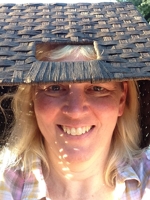
Flowering Dragonflies
by Martha Nance
Martha's dragonfly pond , across the street, is in the Riley-Purgatory-Bluff Creek watershed, but the back door of her prairie home looks right over the lower Minnesota River watershed, where the neck-loving deer flies are definitely above average.
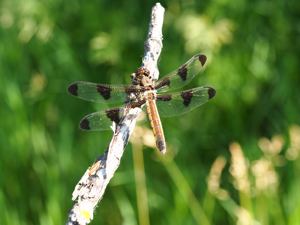
There are said to be upwards of 5,000 species of dragonflies in the world today, and 140 in Minnesota, where I live. Over 25 species live in, or have visited, My Yard on the bluffs near the Minnesota River in the last five years, soaring and hovering into my consciousness each summer.
One of the first things I noticed about the dragonflies in My Yard, once I started noticing anything at all about them other than “look, a big bug!”, is that certain dragonflies appear at certain times in the summer, and then disappear after a few weeks. So, the Dot-Tailed Whitefaces that are all over the field in June, are entirely gone by August, but the first meadow hawks appear in July and die out in October.
As I have spent time over the last few years in my front yard and down by the pond a quarter mile away photographing the colorful and skilled aviators who think of my neighborhood as theirs, I have observed, wondered, learned, and marveled at many things about them. The ancestors of today’s dragonflies came into existence 350 million years ago, and survived the Permian, Triassic, and Cretaceous extinction events of 250, 120, and 65 million years ago. If there is a new generation of dragonflies each year (which is the case for many species), that is a lot of generations in which to refine, well, everything: vision, flight, reproductive strategies, feeding behavior, you name it. After a lifetime harboring an anthropocentric view of evolution drummed into me (by whom? Church, certainly, except I never attended one. Books I read as a young child? Or was it something less intentional, not a premeditated brainwashing but simply the excitement about the discoveries of “the earliest humans” in Africa as I was growing up, that reinforced a sense that the development of humans was the goal, the pinnacle of evolution?) I have finally grasped that the dragonflies of today reflect the culmination of 350 million years of evolution’s work. In contrast, if we really push it, we can find human ancestors dating back seven million years. At 20 years per generation, that adds up to 350 thousand human generations, 1000-fold fewer than the generations spent perfecting dragonflies!
What an amazing privilege it is to see in the skimmers and dashers and club tails and darners of My Yard, the products of so many years of fine-tuning. I see eyes with almost 360-degree vision, with 30,000 separate lenses tuned to distinguish 20 or more different colors of light. I see four corrugated, strutted wings, moving independently using a variety of stroke patterns depending on what the situation calls for—a rapid burst to grab an insect for lunch, a heavily-laden flight with mate in tow, or a multi-thousand mild migration (yes, the 1.5-inch-long Wandering Skimmer crosses the Indian Ocean from India to east Africa and can fly over 4000 miles, and the Green Darners in My Yard fly hundreds of miles along the Mississippi River each fall in swarms large enough to be seen on radar). I see soaring, hovering, perching, brief sorties, guarding of territories, curious and sometimes aggressive behaviors.
I spent three years photographing dragonflies without leaving the confines of the field and garden in my front yard, except for straying into the next-door neighbor’s field that is contiguous with ours. But one day, I wandered down to the pond, and found a whole different dragonfly world there.
Dragonflies spend the vast majority of their lives in the water, their larval forms striking terror into the minds of any other larval insects, and even small fish, that might share their space. They are fearsome underwater predators, with an extensible prehensile jaw that rivals the tongue of an amphibian in speed and accuracy when grabbing prey. I have not gotten so obsessed as to immerse myself or my camera into the water to document their underwater lives, but I admit to knowing that jaw-action videos are available on You Tube for those who are interested.
What I have watched and found awe-inspiring, like watching a caterpillar wrap itself into a pupa and later emerge as a butterfly, is the moment that a brave dragonfly takes its first steps out of the water (which are in fact also its last, as adult dragonflies do not walk!), breathes air, climbs up and attaches to a nearby reed or blade of grass, emerges from its old half-size, compressed, brown, silt-covered shell into a four-winged, multicolored, huge-eyed insect, shakes off the wet, and takes flight for the first time. This whole process takes an hour or two. As far as I know, no other human in my neighborhood has kneeled in the muck to watch this remarkable but commonplace event take place; it took me almost 60 years to get to it.
It is hard not to notice that our neighborhood pond is fragile. A dry summer or lack of snow leads to a lower water level. The edge of the pond retreats, and one wonders if it will dry up completely in a few years. The first year I spent time at the pond, marveling at the many exuviae (discarded larval skins) attached to the many reeds at its edge, another visitor, a muskrat, moved in and destroyed all of the reeds on my end of the pond. A beaver family is hard at work destroying the habitat that likely attracted them to the pond, taking out trees one by one. The community mosquito patrol bombs any open areas of water while we are at work in the summer. And a new human neighbor, in defiance of toothless neighborhood covenants, has been strafing the pond this winter with his snowmobile, to be followed next summer, no doubt, by a jet ski. I’m not sure that the pond that attracted me to this neighborhood 25 years ago will survive.
But I think I have an answer to one of my many questions: why do dragonflies bother having an airborne life stage? They have a very successful first stage, as skilled underwater predators. Why not stay underwater for that final, reproductive, stage? I think the answer is that the dragonflies I see doing racetracks over my field, darting up from garden stakes to grab a fly and re-perch, and chasing each other over the pond, are the dragonfly equivalent of a flower. The milkweed plants out in the field, and the tithonias I grow, spend most of their time as ignorable but increasingly large green structures, until magically their flowers appear, which attract bees and monarchs from miles around, and pretty soon seeds for the next generation appear, and in the case of the milkweed, fly off in all directions.
Dragonflies do not require bees and monarchs like the flowering plants do, but they attract each other with their bright colors and flight skills. Like the flowers in my yard, different damsels and dragons appear at different times during the summer—I no more expect to see a Four-Spotted Skimmer or Horned Clubtail bloom in August than a daffodil or a lilac. And importantly, if my pond dries up, has no more mosquitoes to eat, no reeds to grab, and no trees to provide shade, my Cherry-Faced Meadowhawks and Blue Dashers will fly to the next pond, at least some of them will, and the Canada Darners, Black Saddlebags, and Wandering Gliders are just passing through anyway, on their way to wherever the food is most dense, at the beginning of the summer, and to warmer ponds at the end.
As long as there are water, air, and other flying insects, dragonflies will survive. If global warming makes the tropics too hot, melts the glaciers, and makes parts of the world inhospitable for humans, flowering dragonflies will find new ponds and streams to give them life. No humans required.
© Martha Nance

Tuesday Mornings Together on the Buffalo
by Kate Wylie
Kate lives in the Maline Creek-Mississippi River watershed. She spends time in both Missouri and Arkansas River valleys and finds great joy in tending to her urban garden.

We stand on either side of the river with an
end of rope in hand and pull to reveal the
slackened trotline, three fish dangling from
old curved hooks, a waterlogged chip bag
caught on another. Grandfather gestures to
let the line down; he’ll wade in to get it.
The rope goes limp through my hands and
slowly water rises around him, first
rubber-clad shins, then calves, and finally
thighs. He pushes against the undertow,
struggling toward the deepest deep, the
middle of middles, where the plastic bag
bobs on the surface, bending sunlight into
his eyes. Every summer, I grow more
afraid that he’ll be swept away one day
when the river grows unnerved by our
incessant need for sustenance. But today,
like all others before, he gathers fish in the
basket, pockets the plastic bag and rejoins
me on the other side, muddy water
retreating from the tops of his waders.
© Kate Wylie
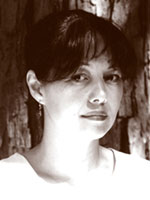
Lost Pines
by Linda Watanabe McFerrin
Linda lives near the eastern shore of the San Francisco Bay.

This year the Japanese beetle
has attacked my pines.
I will sell no trees this Christmas.
My wife works diligently,
makes baskets from the dead needles –
and me, with nothing to put in them.
From the author’s collection, Navigating the Divide: Selected Poetry and Prose
© Linda Watanabe McFerrin

Ode to Cedar Waxwings and Toyon Berries
by Angie Minkin
Angie lives in the Visitacion Valley watershed in San Francisco on the edge of McLaren Park, where Monterey cedars grow tall and coast oaks stand unbending in summer winds. Yosemite Creek used to flow here, and she hikes the trails looking for tributaries and swallowtail butterflies.

Black-crested and yellow-dipped, you arrive
to show us how to feast fully. The being of you,
the life of you, too many to count,
you gray-silked, juice-addled gluttons.
You chatter and gorge on the toyon berries,
red and dripping from the tree that emerged
by magic—a city-sized beanstalk, a miracle
from a seed dropped, perhaps, by your ghost-mother.
Thick, bronze leaves shadow my backyard Buddha
as the fruit falls in his lap. He smiles at the neighbors
as they hack the branches hanging over the fence.
How they hate the stains stuck on their cement yard.
Don’t they know this native endures?
I hush, freeze—try to spy. You startle,
rise as one, your wings beating.
You settle on phone wires, until the cat sleeps,
the sun drifts, and you can’t resist the lure
of those siren seeds. You’ll carry the leathery pods,
release them in another garden in another time,
and another woman will wonder
where did that tree come from?
Branches stripped, you ascend, tiny scraps
of fog, quiet now in the wind’s hustle.
I climb on top of my Buddha’s shoulders,
check my back for sprouting feathers.
Dear waxwings—
If I stretch my arms high enough,
weave my hair with toyon berries,
will you spirit me away?
© Angie Minkin

The Ecstasy of Thrushes
by Maggie Wadey
From Maggie’s desk in Hackney, East London, she looks across a park to the Olympic Site, where there's a sense of a big open sky and the Thames River, with its wide flat estuary, being within easy reach. In her narrow, city garden she has grey squirrels, foxes, a lot of cats, 'cockney' sparrows, crows and green parakeets.

Leafy tendrils trailing
sweep the crow through dapple
onto sunlit grass and there he struts, a black knight,
abusing his rights yet a most tender father, softly croaking
daddy-style advice and giving reassurance to his wife with
a sound like pebbles rolling in a bucket, plucking
thrush fledglings from their nest to lay them at her feet,
a brutal gallantry driven by envy of so much potential
musical dexterity quite beyond his own capacity.
Meanwhile, from their illegal swift-box squat,
dozens of shameless sparrows thread back and forth,
weaving a tapestry of airy paths across this narrow city garden
which, like a Lady Chapel with its ever-burning lamp,
is shadowy and flower-scented, a precious vessel lit by
the miracle of long-blooming, swoon-inducing roses where a team –
though mostly solitary – of bees work the immodest flowers
for all they’re worth and then, like courtiers, shuffle backwards,
lift off, move on, over-laden, beyond this deck-chaired semi-haven,
gated but not locked, and our minds, being human, are both
drowsing here and at the same time skidding off elsewhere,
nervous and venal as rabbits, our clocks forever tik-toking
with adolescent fear of missing out, afraid we haven’t understood
enough, that we’ve ignored the roar beyond our walls, fretful, until,
filled to the brim with sun we drown our minds and let our stress-
blown bodies float on a warm tide of blood and honey.
Now, unseen, a creature of a different order stutters into song,
piercing the air with shrill-voiced clarity, swooping low in liquid loops,
like an acrobat at practice on the wire it stalls, waits, repeats,
hesitates, until, from somewhere in the leafy ash above us
it hurls its thrilling leitmotif, the same in storm,
in lust or grief: the ecstasy of thrushes.
But we are asleep and dreaming.
The gate has long been locked
and the songbirds
practise silence.
© Maggie Wadey